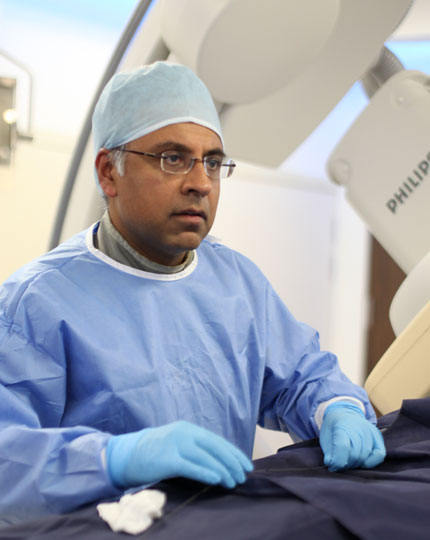PERCUTANEOUS CORONARY ANGIOPLASTY

In many cases, narrowings or blockages (atheromatous plaque) of the coronary arteries can be treated by a procedure called coronary angioplasty or intervention. It has been consistently shown to improve symptoms (angina, breathlessness) secondary to coronary artery disease. The technique is similar to the coronary angiogram from the patient’s point of view and may follow on immediately after the angiogram in the Catheterization Laboratory.
A blood thinner, usually heparin, is administered to prevent the formation of blood clots. In the same position, a further pre-shaped, soft flexible tube (called the guiding catheter) is passed up the femoral or radial artery and positioned at the mouth of the coronary artery which has the narrowing. Through this tube, a very fine wire is navigated across the narrowing. Your cardiologist manipulates the movement and direction of the wire from the end that sits outside the patient. When the wire tip is safely placed at the far end of the artery, a tiny balloon is slid over the wire and positioned at the narrowed segment of artery. The balloon is inflated to high pressure using a special hydraulic inflation device. The pressure delivered to the balloon is transmitted to the arterial wall and compresses the atheromatous plaque, thereby stretching open the artery. A variety of different balloons may be used, depending on the length of the blockage and how much calcium is present.
Your cardiologist will then usually decide to deploy a stent (wire mesh tube) which supports the newly stretched opened segment of artery. The stent is pre-mounted on a balloon and is implanted by inflating the balloon at the same previously treated site. The stent may be coated with a drug which is gradually released into the vessel wall over time and is proven to significantly reduce the risk of ‘scarring’ which would lead to re-narrowing within the stent and the return of symptoms. Your cardiologist will decide which specific stent is best for you during the procedure. The whole procedure is performed under real time X-ray imaging and requires the assistance of a team comprising nurses and a technologist.
Once the coronary artery has been successfully treated, the access tube in the wrist or leg is removed and the hole closed by physical pressure or with a plug. Coronary angioplasty requires an overnight stay in hospital. An ECG and repeat blood tests are performed the following morning. If there are no complications, you will be allowed home early the next day.



